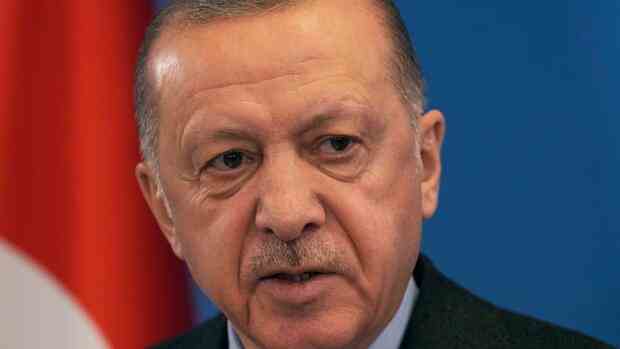The Turkish head of state is confident of victory.
(Photo: dpa)
Ankara Again and again there were rumors that Turkey would postpone the ballot because of the earthquake disaster. The technical problems in the affected region are too great, and criticism of the government’s lack of crisis management has ruined the president’s reputation.
But now Recep Tayyip Erdogan has made a decision: the parliamentary and presidential elections will take place on May 14 as planned. The Turkish head of state argued that it was important not to lose any time in rebuilding after the quake.
Erdogan signed a corresponding decree on Friday, and shortly thereafter the election authority confirmed the date. The elections come just three months after the natural disaster that killed more than 47,000 people in Turkey alone.
For Erdogan, who has been in power for 20 years, the vote is likely to be the most challenging of his career, not only in view of the aftermath of the earthquake. His poll numbers have been at a low for a long time. At the same time, however, the individual opposition parties cannot unite a clear majority.
The elections could be a vote on whether the people of Turkey want to continue supporting the increasingly authoritarian course of their head of state.
Erdogan attacks the opposition parties
In his first official campaign speech on Friday, Erdogan tried both to close his own ranks behind him and to drive the opposition ahead of him. The aim is to build 319,000 apartments and village houses within a year.
According to political observers, by focusing on reconstruction, he is trying to dispel criticism of his crisis management.
According to the schedule, the elections should actually have taken place in June, but Erdogan brought the early date in May into play at the beginning of the year – and has now made it official.
The main reason for the move forward, Erdogan said, was that the election coincided with the main pilgrimage season for Muslims to Mecca and university exams. However, observers assume that Erdogan is also bringing the date forward so that election gifts such as doubling the minimum wage are still present against the background of strong inflation.
Polls predict a tight race, in some cases the opposition alliance is ahead of the AKP-led government coalition. Although polls show Erdogan remains Turkey’s most popular politician, amid the worst inflationary streak in 20 years, his AKP party has also lost support among poorer sections of the population – typically his staunchest supporters.
More: How the Turkish government is trying to control the media after the earthquake
